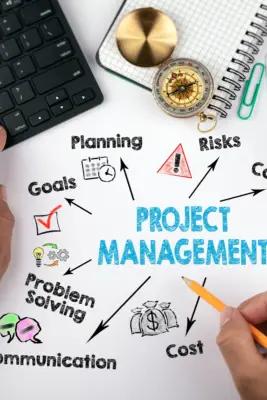Essential skills, such as time and budget management, strategic planning, and standardized methods, are essential for a project manager in healthcare to succeed.
Effective leadership, clear communication, and knowledge of regulatory compliance are also critical. Ensuring that healthcare facilities comply with regulations is a crucial part of this knowledge. Personal attributes such as resilience, continuous learning, empathy, a strong work ethic, and attention to detail enhance success.
Mastering project management, effectively leading teams, understanding industry regulations, and demonstrating other key skills and personal traits are necessary for excelling in this specialized field.

These foundational elements form the basis for successfully navigating the complexities of healthcare project management and achieving desired outcomes.
Key Takeaways
- Master time and budget management skills.
- Stay updated on healthcare regulations.
- Foster effective leadership and team management.
- Utilize standardized project management methods.
- Demonstrate resilience and commitment to continuous improvement.
Essential Project Management Skills
To excel as a project manager in education and healthcare, it is imperative to master time and budget management skills, ensuring projects are completed efficiently and cost-effectively.
Managing patient fees is a crucial aspect of budget management in healthcare projects, as it directly impacts the financial health of the organization.
Strategic planning techniques are pivotal in setting clear objectives and outlining the path to achieving them, fostering success in healthcare project management.
Utilizing standardized methods aids in maintaining consistency and quality while tracking progress using appropriate tools, which enhances project oversight and decision-making capabilities.
Time and Budget Management
Effective time and budget management are crucial skills that healthcare project managers must master to guarantee the successful delivery of projects.
Strategic planning is essential in health management, ensuring project success by enabling healthcare project managers to create a detailed master project plan, prioritize tasks efficiently, and allocate resources effectively.
Project managers can stay on track with timelines and manage their budgets by monitoring progress and adapting to changing circumstances through continuous task prioritization.
Utilizing standardized methods and tracking tools further aids stakeholders in overseeing resource allocation and achieving desired project outcomes.
Ultimately, mastering time management and budget management is essential for healthcare project managers to navigate the complexities of healthcare projects and deliver results within the specified constraints.
Strategic Planning Techniques
Mastering strategic planning techniques is imperative for healthcare project managers to navigate the complexities of project management successfully.
In healthcare project management, strategic planning involves outlining project objectives, tasks, and timelines in detail while ensuring alignment with industry standards and regulations.
Project managers must continuously adjust tasks and milestones to adapt to changing circumstances within healthcare projects.
Utilizing decision-making models and analysis tools is essential for identifying risks and gaps in contingency planning during strategic planning processes.
Success in healthcare project management hinges on integrating past lessons with new methodologies to enhance strategic planning effectiveness.
Standardized Methods Utilization
Utilizing standardized methods in healthcare project management ensures consistency and efficiency throughout project execution. Standardized methods help streamline processes, reduce errors, and improve project quality.
Implementing these methods enhances communication and collaboration among team members, fostering a cohesive working environment.
By adhering to standardized project management practices, project managers can better track progress, milestones, and outcomes, increasing project success and stakeholder satisfaction.
Effective Leadership and Team Management
Effective leadership in healthcare project management involves motivating team members to achieve project goals and consistently evaluating their performance.
Monitoring team performance guarantees that tasks are completed efficiently and identifies areas for improvement or additional support.
Inspiring Team Members
Consistently monitoring daily performance and progress is essential for inspiring team members in healthcare project management. To effectively inspire team members, project managers can employ various strategies:
- Recognize and appreciate individual contributions to boost morale.
- Provide opportunities for professional growth and skill development.
- Foster a culture of open communication and feedback to guarantee everyone feels valued.
- Lead by example, demonstrating dedication, integrity, and a strong work ethic.
Monitoring Team Performance
Regularly tracking and evaluating team performance is fundamental to effective leadership and team management in healthcare project management.
Monitoring team performance involves daily tracking progress and outcomes to guarantee project success.
Effective leadership includes inspiring and motivating team members to achieve project goals.
Mentoring and disciplining staff when necessary are vital aspects of team management.
Trusting and empowering employees can boost team morale and productivity.
Understanding different leadership styles and adapting them as needed can help build an efficient and effective project team.
Clear Communication and Problem-Solving
Clear communication is crucial in healthcare project management as it guarantees that all team members understand their roles and responsibilities.
Problem-solving skills are essential for addressing issues that may arise during the project, leading to effective resolutions.
Effective Communication Strategies
Effective communication strategies and strong problem-solving skills form the foundation for successful healthcare project management. To guarantee efficient healthcare project manager outcomes, consider the following:
- Regular updates: Keeping all team members informed of progress and changes maintains transparency and alignment.
- Feedback sessions: Providing a platform for constructive feedback encourages continuous improvement and enhances team collaboration.
- Open dialogue: Fostering an environment where team members feel comfortable sharing ideas and concerns promotes innovation and problem-solving.
- Preemptive addressing: Proactively clarifying the 5Ws/1H helps prevent misunderstandings and ensures clear communication channels in healthcare projects.
Training employees in effective communication further strengthens team cohesion and contributes to project success.
Proactive Problem-Solving Approaches
Maintaining open dialogue and clear communication channels is fundamental for executing proactive problem-solving approaches in healthcare project management.
Effective proactive problem-solving hinges on establishing communication protocols that keep all team members informed and aligned with project goals.
Structured methods and effective communication foster team collaboration and innovation in addressing challenges within healthcare projects and programs.
By training team members in communication techniques, project managers can enhance their problem-solving processes and achieve successful outcomes.
Implementing systematic problem-solving tools enables project managers to address issues and guarantee project success preemptively.

In healthcare project management, integrating clear communication, team collaboration, and innovative problem-solving techniques is crucial for achieving favorable results.
Industry Knowledge and Regulations
Understanding healthcare industry regulations and having in-depth knowledge of standards like HIPAA and HITECH are essential for project managers in healthcare to guarantee compliance and ethical practices.
Familiarity with healthcare systems such as EMRs and EHRs is vital for effective project management. It enables seamless integration and coordination within healthcare settings.
Keeping abreast of healthcare quality measures like HEDIS and MIPS plays a critical role in project planning and execution, facilitating the delivery of high-quality care and outcomes.
Regulatory Compliance Awareness
Thorough knowledge of healthcare industry regulations, such as HIPAA and FDA guidelines, is indispensable for project managers in the healthcare sector.
Understanding regulatory compliance is essential for guaranteeing projects meet legal requirements and industry standards and promote patient safety, data security, and quality of care.
To excel in regulatory compliance awareness, project managers should:
- Stay updated on changing regulations to prevent penalties and delays.
- Implement strategies to confirm projects adhere to industry-specific regulations effectively.
- Conduct regular audits to ensure compliance with healthcare regulations.
- Collaborate with legal and compliance teams to address any regulatory issues promptly.
Healthcare Industry Expertise
Proficiency in healthcare industry knowledge and regulations is essential for project managers seeking success in the healthcare sector. Having a formal degree or certification in areas such as public health administration, business administration, health management, or nursing is crucial to stand out in a competitive job market.
Understanding the intricacies of healthcare facilities, project planning, and healthcare facility administration is vital for effective project management in the medical sector.
Healthcare project managers must navigate the complex landscape of healthcare professionals, healthcare managers, and healthcare facilities while using patient fees and adhering to stringent regulatory frameworks.
Knowledge of healthcare industry trends, Electronic Health Records (EHR) systems, and healthcare reimbursement models is critical for project success and compliance.
Familiarity with healthcare quality metrics and data security protocols further enhances the ability of health administration to measure project impact on patient outcomes.
In-depth expertise in the healthcare industry equips project managers to lead projects efficiently and contribute significantly to advancing healthcare services.

Personal Attributes for Success
Exhibiting attention to detail is essential for healthcare project managers to safeguard precision in patient care procedures and project outcomes.
To succeed in the demanding healthcare project management field, individuals must possess a combination of personal attributes that enhance their effectiveness.
- Resilience: Facing challenges head-on and adapting to unexpected changes is vital for overcoming obstacles in healthcare project delivery.
- Commitment to Learning: To achieve success, project managers must be committed to continuous improvement and stay updated on industry trends, regulations, and best practices.
- Empathy: Building strong relationships through understanding and compassion towards patients and staff fosters better collaboration and enhances patient care.
- Strong Work Ethic: Meeting deadlines, managing resources effectively, and delivering quality results are all underpinned by a strong work ethic in healthcare project management.
Frequently Asked Questions
What Does a Project Manager Do in Healthcare?
In healthcare, a project manager oversees initiatives to achieve specific health outcomes, addresses issues, leads teams, and implements solutions.
This role demands strong project management skills, effective leadership, clear communication, problem-solving abilities, adaptability, and knowledge of healthcare regulations.
How Do I Break Into Healthcare Project Management?
To break into healthcare project management, start by obtaining a relevant undergraduate degree, gaining project management experience, pursuing certifications like PMP or CAPM, networking in the industry, and showcasing transferable skills. Continuous learning and industry knowledge are essential for success.
What Is the Best Project Management Style for Healthcare?
The best project management style for healthcare depends on factors like project complexity, stakeholder involvement, and regulatory requirements. Agile offers flexibility, Waterfall suits well-defined projects, while Hybrid combines adaptability and structure, making the choice project-specific.
What Are the 7 Steps to Project Planning Success for Project Managers?
The 7 steps to project planning success for project managers involve defining scope, objectives, and deliverables, creating a detailed project plan, closely monitoring progress, making necessary adjustments, evaluating outcomes, seeking feedback, learning, and adapting strategies.

Conclusion
To sum up, mastering the essential skills of project management, effective leadership, clear communication, business administration, industry knowledge, and personal attributes is vital for success in healthcare project management.
By honing these competencies and traits, project managers can navigate the complexities of healthcare projects with precision and efficiency, ultimately driving successful outcomes and contributing to improving healthcare systems.

Chris Ekai is a Risk Management expert with over 10 years of experience in the field. He has a Master’s(MSc) degree in Risk Management from University of Portsmouth and is a CPA and Finance professional. He currently works as a Content Manager at Risk Publishing, writing about Enterprise Risk Management, Business Continuity Management and Project Management.

